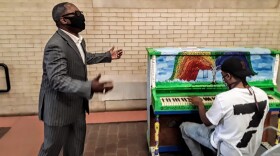This week has been filled with protests across the country over police brutality, after the death of George Floyd at police hands in Minnesota. There were several demonstrations in western Massachusetts, which were largely peaceful.
In Springfield, an estimated 3,000 people showed up for a march that started at Central High School and ended with a protest at police headquarters. Springfield resident Mary Kiriba was there.
"When I see my community being disrespected and killed, and no voice, I feel I'm the voice...I'm the voice of my community," Kiriba told WGBY.
Springfield's police have been caught on video doing violent things to people of color in recent years. Some officers who were charged with trying to cover up one incident involving off-duty police were recently reinstated, but later removed from the streets.
Panelist Matt Szafranski reported on the Springfield protest, which he noted also comes amid a longstanding disagreement between Mayor Domenic Sarno and the City Council over a civilian review board.
"It's a very weird landscape that we have here in the city compared to some of the national conversation which just seems to be more generally about lack of accountability and police brutality," Szafranski said.
In Holyoke, more than a thousand protesters marched from city hall to the police station. The organizers had remarkable control over the crowd, and were intent on making sure there was no property damage. Simbrit Paskins is a teacher at Holyoke High School.
"As quick as we might want to tear down, to wake these people up, it won't be built back up as fast," she said.
The protest has had a tangible impact, according to panelist Natalia Muñoz. She pointed to the announcement Friday by Holyoke's mayor and police chief that they were incorporating the #8cantwait changes to police procedures, and launching a civilian review committee.
The changes will "keep everybody safe, even people who the police may decide right there on the spot are guilty of something, or have caused them enormous frustration because they had to run after them...do not hurt them," she said. "Stop them, detain them, put 'cuffs on them — don't shoot them."
A day earlier in Northampton, there were no arrests but police said some protesters threw rocks at officers, and broke the windshield of a cruiser. Officers sprayed some protesters with pepper spray because while trying to keep a police station door closed. Eventually, police chief Jody Kasper agreed to protesters' demands to kneel in order to end the standoff.
"I can tell you, as someone who knows [Kasper], that was an an authentic thing that she did," Muñoz said. "That was not an act for public relations for the police department; that is her."
The request for police to kneel with protesters has surfaced at demonstrations across the county.
"I have a very complicated feeling about how important that is in particular," Szafranski said. "I think what happened in Northampton, if it was a humility thing or just to get [the protest] over with, I don't know what that really accomplishes if that's what the back-and-forth ends up being about."
As similar protests are scheduled for this weekend in western Massachusetts, and beyond, some medical professional are worried these gatherings could spread the coronavirus. Trends surrounding COVID-19 have generally been headed in a favorable direction in Massachusetts and across New England.
And against the backdrop of these protests and the pandemic, there was a debate this week between Massachusetts U.S. Senator Ed Markey and his Democratic challenger Joe Kennedy.
Guests:
- Matt Szafranski, editor, Western Mass Politics & Insight
- Natalia Muñoz, host, Vaya Con Muñoz on WHMP







